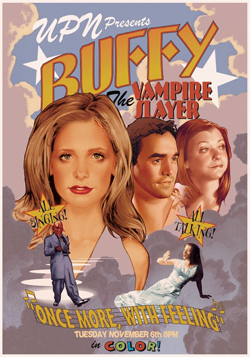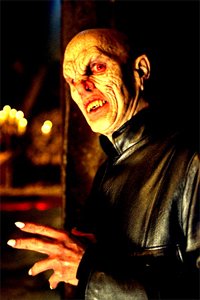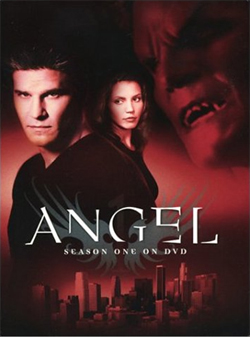Related Research Articles

Buffy Anne Summers is the title character of the Buffy the Vampire Slayer franchise. She first appeared in the 1992 film Buffy the Vampire Slayer before going on to appear in The WB/UPN 1997–2003 television series and subsequent 1998–2018 Dark Horse and 2019–present Boom! Studios comic series of the same name. The character has also appeared in the spin-off series Angel, as well as numerous expanded universe materials such as novels and video games. Buffy was portrayed by Kristy Swanson in the film and by Sarah Michelle Gellar in the television series. Giselle Loren has lent her voice to the character in both the Buffy video games and an unproduced animated series, while Kelly Albanese lent her voice to the character in the Buffy the Vampire Slayer Season Eight motion comics.

Buffy the Vampire Slayer is an American supernatural drama television series created by writer and director Joss Whedon. The concept is based on the 1992 film, also written by Whedon, although they are separate and unrelated productions. Whedon served as executive producer and showrunner of the series under his production tag Mutant Enemy Productions. It premiered on March 10, 1997, on The WB and concluded on May 20, 2003, on UPN.

William "Spike" Pratt, played by James Marsters, is a fictional character created by Joss Whedon and David Greenwalt for the television series Buffy the Vampire Slayer and Angel. Spike is a vampire and played various roles on the shows, including villain, anti-hero, trickster and romantic interest. For Marsters, the role as Spike began a career in science fiction television, becoming "the obvious go-to guy for US cult [television]." For creator Whedon, Spike is the "most fully developed" of his characters. The character was intended to be a brief villain, with Whedon originally adamant to not have another major "romantic vampire" character like Angel. Marsters says "Spike was supposed to be dirty and evil, punk rock, and then dead." However, the character ended up staying through the second season, and then returning in the fourth to replace Cordelia as "the character who told Buffy she was stupid and about to die."

Tara Maclay is a fictional character created for the action-horror/fantasy television series Buffy the Vampire Slayer (1997–2003). She was developed by Joss Whedon and portrayed by Amber Benson. Tara is a shy young woman with magical talents who falls in love with Willow Rosenberg, one of the core characters. Together, they help Buffy Summers, who has been given superhuman powers, to defeat evil forces in the fictional town of Sunnydale.

Faith Lehane is a fictional character created by Joss Whedon for the television series Buffy the Vampire Slayer. Played by actress Eliza Dushku, Faith was introduced in the third season of Buffy and was a focus of that season's overarching plot. She returned for shorter story arcs on Buffy and its spin-off, Angel. The character's story is continued in the comic book series Buffy the Vampire Slayer Season Eight, and she also appears in apocryphal material such as other comic books and novels. Faith was set to receive her own spin-off television series after the final season of Buffy, but Eliza Dushku declined the offer, and the series was never made. The character later co-stars in the 25-issue comic book Angel & Faith beginning in August 2011 under the banner of Buffy the Vampire Slayer Season Nine, the story taking place mostly in London and the surrounding area. Seven years after the character's creation, Whedon granted her the surname Lehane for a role-playing game and subsequent material. The last issue of Season Eight was the first source officially confirmed to be canon that referred to Faith by her full name.

"Once More, with Feeling" is the seventh episode of the sixth season of the supernatural drama television series Buffy the Vampire Slayer (1997–2003), and the only one in the series that is a musical. It was written and directed by series creator Joss Whedon and originally aired on UPN in the United States on November 6, 2001.

The Master is a fictional character on the action-horror/fantasy television series Buffy the Vampire Slayer (1997–2003). He is a centuries-old vampire portrayed by Mark Metcalf, determined to open the portal to hell below Sunnydale High School in the fictional town of Sunnydale. The Master is the first season's Big Bad.

Richard Wilkins III is a fictional character in the fantasy television series Buffy the Vampire Slayer (1997–2003). Portrayed by Harry Groener, he is the mayor of Sunnydale, a fictional town rife with vampires and demons in which the main character, Buffy Summers lives. The premise of the series is that Buffy is a Slayer, a young girl endowed with superhuman powers to fight evil, which she accomplishes with the help of a small group of friends and family, called the Scooby Gang. During the show's second season, it becomes apparent that local authorities are aware of the endemic evil in the town, and either ignore it or are complicit in making it worse. The third season reveals that the Mayor is behind this conspiracy to hide and worsen Sunnydale's supernatural phenomena, as part of his century-long plot to take over the world, making him the season's primary villain, or Big Bad. His genial demeanor, promotion of family values, casual phobia of germs, and dislike of swearing belie his evil nature. The series regularly employs monsters and elements of horror to symbolize real problems, and the abuse of power in relation to the forces of darkness is a repeated theme throughout the series, as well as in its spin-off Angel.

"Restless" is the 22nd episode and season finale of season four of the supernatural drama television series Buffy the Vampire Slayer (1997–2003), and the 78th episode of the series overall. The episode was written and directed by the show's creator Joss Whedon and originally aired on The WB in the United States on May 23, 2000.
"The Body" is the sixteenth episode of the fifth season of the supernatural drama television series Buffy the Vampire Slayer. The episode was written and directed by series creator Joss Whedon and originally aired on The WB in the United States on February 27, 2001. In the series, Buffy Summers is a teenager chosen by mystical forces and endowed with superhuman powers to defeat vampires, demons, and other evils in the fictional town of Sunnydale. She is supported in her struggles by a close circle of friends and family, nicknamed the "Scooby Gang". In "The Body", Buffy is powerless as she comes upon her lifeless mother, who has died of a brain aneurysm.
Darla is a recurring fictional character created by Joss Whedon and played by Julie Benz in the first, second, and fifth seasons of the American supernatural television series Buffy the Vampire Slayer. The character later appeared in the Buffy spin-off series Angel, making at least one appearance in every season. She made her last television appearance in 2004, appearing as a special guest star in the fifth and final season of Angel.
"Spin the Bottle" is the sixth episode of the fourth season of the American television series Angel. Written and directed by series creator Joss Whedon, it was originally broadcast on November 10, 2002 on the WB television network. In "Spin the Bottle", Lorne performs a magic spell on Cordelia to help her regain her memory, but instead the spell causes all the Angel Investigations members to revert to their teenage personae.
The Buffyverse canon consists of materials that are thought to be genuine and those events, characters, settings, etc., that are considered to have inarguable existence within the fictional universe established by the television series Buffy the Vampire Slayer. The Buffyverse is expanded through other additional materials such as comics, novels, pilots, promos and video games which do not necessarily take place in exactly the same fictional continuity as the Buffy episodes and Angel episodes. Star Trek, Star Wars, Stargate and other prolific sci-fi and fantasy franchises have similarly gathered complex fictional continuities through hundreds of stories told in different formats.
In the fictional world of the television series Buffy the Vampire Slayer and its spin-off series Angel, a vampire is a unique variety of demon that can exist on the earthly plane only by inhabiting and animating a human corpse. In Fray, a Buffy comic book spin-off set about a century in the future, vampires are also called "lurks".
The popular fictional Buffyverse established by TV series, Buffy the Vampire Slayer and Angel has led to attempts to develop more commercially viable programs set in the fictional 'Buffyverse'. However some of these projects remain undeveloped for various reasons: sometimes, vital cast members may be unavailable; alternatively, studios and networks which would provide capital for the spinoffs might remain unconvinced that such projects are financially viable.
"Welcome to the Hellmouth" is the series premiere of the American supernatural drama television series Buffy the Vampire Slayer. It originally aired on The WB on March 10, 1997 in a two-hour premiere along with the following episode, "The Harvest". The episode was written by the series creator and executive producer Joss Whedon and directed by Charles Martin Smith. "Welcome to the Hellmouth" received a Nielsen rating of 3.4 upon its original airing and received largely positive reviews from critics.
"Business School" is the seventeenth episode of the third season of the American version of The Office and the show's 45th overall. In the episode, Michael Scott is invited by Ryan Howard to speak to his business school class. When many of the students question the usefulness of paper in a computerized world, Michael attempts to inform the class of how essential paper is. Meanwhile, a bat becomes trapped in the office, leading Dwight Schrute on a mission to protect the employees.

The first season of the American supernatural drama television series Buffy the Vampire Slayer originally aired between March 10 and June 2, 1997, on The WB. Conceived as a mid-season replacement, the season consists of twelve episodes, each running approximately 45 minutes in length, and originally aired on Mondays at 9:00 pm ET.

The sixth season of the television series Buffy the Vampire Slayer premiered on October 2, 2001, with a two-hour premiere on UPN and concluded its 22-episode season with a two-hour finale on May 21, 2002. It maintained its previous timeslot, airing Tuesdays at 8:00 pm ET. This season marked the series' network change from The WB to UPN.

The first season of the television series Angel, the spin-off of Buffy the Vampire Slayer, premiered on October 5, 1999, on The WB and concluded its 22-episode season on May 23, 2000. The season aired on Tuesdays at 9:00 pm ET, following Buffy.
References
- ↑ Brian Ford Sullivan (January 7, 2003). "The 50 Best Episodes of 2002 - #40-31". The Futon Critic. Retrieved August 2, 2010.
- ↑ "10 Questions for Joss Whedon". New York Times. May 16, 2003. Retrieved July 20, 2007.
- ↑ Slayers and Vampires; The Complete Uncensored, Unauthorized, Oral History of Buffy the Vampire Slayer and Angel ISBN 978-0-7522-6635-0 p238-9
- ↑ Eley, Candice Renee (March 16, 2020). "10 Times Buffy the Vampire Slayer Mirrored Star Trek: The Next Generation". Women at Warp. Retrieved December 22, 2023.